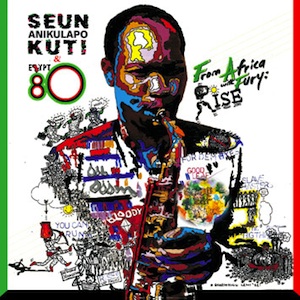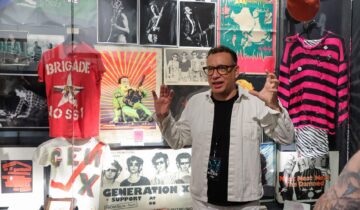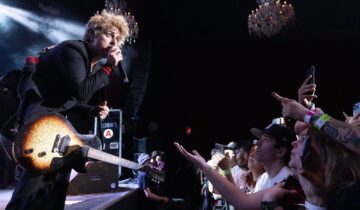 Seun Kuti, an Afrobeat bandleader and the youngest son of Fela Kuti, is on tour to support his new album, “From Africa With Fury: Rise“, produced by Brian Eno. With its strong horn melodies, grooving rhythms and punchy song titles (“African Soldier”, “Rise”), the album is a mix of classic, energetic Afrobeat rhythms and contemporary issues. Never one to shy away from politics, he tends to inject a bit of lively commentary in his shows. In a recent Soul Rebels gig in London, he took aim at events in Libya and Gaza, saying it was foolish to bomb civilians in order to protect them. He has also discussed starting his own political party.
Seun Kuti, an Afrobeat bandleader and the youngest son of Fela Kuti, is on tour to support his new album, “From Africa With Fury: Rise“, produced by Brian Eno. With its strong horn melodies, grooving rhythms and punchy song titles (“African Soldier”, “Rise”), the album is a mix of classic, energetic Afrobeat rhythms and contemporary issues. Never one to shy away from politics, he tends to inject a bit of lively commentary in his shows. In a recent Soul Rebels gig in London, he took aim at events in Libya and Gaza, saying it was foolish to bomb civilians in order to protect them. He has also discussed starting his own political party.
Mr Kuti took a minute out of his busy tour schedule to respond to a few questions over e-mail about Afrobeat, African politics and touring.
Your new album, “From Africa With Fury: Rise”, seems in sync with recent revolutionary events in some North African countries. Is your music a soundtrack for this revolution?
I think my music is a soundtrack for all Africa not just the revolutionaries. It’s all about keen observation of the situation of people’s lives, and you know there is not a lot more people can take.
You mentioned recently that you were thinking of starting your own political party. If you did, what would your first priority be?
No comment.
Your new album was produced by Brian Eno and John Reynolds. How have they helped shape your sound?
Brian has been a good supporter of me and my music for about two years now. I asked him in May last year if he will help with producing the album and he agreed. I had a great time producing the album with these guys in London because they opened up the sound in many ways. We all had the same idea of what we wanted it to sound like, so it was easy to get it done. But the ideas they came up with were nothing short of genius. They easily took the album up another 80%, at least.
What are you most excited about with your new album? How does it differ most from your previous work?
I am most excited about the evolution of my sound. It doesn’t change but it has become a lot more mature and confident. I think people will notice that. This album makes you feel the struggle of the black continent—even if people don’t understand the pidgin English lyrics, they can understand the passion in the songs.
What music are young people today in West Africa listening to?
Well I personally think I am not the average African youth because of my exposure to the world and my upbringing in relations to music and politics. Music in Africa is all about MTV and what is out there on the TV and radio. Real music is not given a chance.
Are young people forming new Afrobeat bands in Nigeria?
No they are not. I meet a lot of young men and women who are totally inspired by Afrobeat music, but they can’t practice because of the economic and social restraint of producing real music in Africa today. Most youth go the commercial music way cos its a short-cut that is cheap and affordable. There’s no welfare in Africa so whatever you are doing has to pay the bills or the band collapses. People have to feed themselves and their families. But I know things will change and people will sacrifice well-being for the opportunity to speak for themselves. This is the new Africa as you can see in Tunisia already. People are gonna speak for themselves and Afrobeat will be their voice!
What do you enjoy most about touring?
I am looking forward the most to the screaming fans everywhere in the world.
What is it like to play with your father’s former band, Egypt 80?
Because I am almost like family with them it makes it a happy workplace. It is not a fairytale land far away; we have our differences, but we get over them easily. I think the biggest challenge was to make everyone believe in a life after Fela, and they have challenged me to keep that faith!
The message of Egypt 80 is quite unique to that of any other band. With this band it’s not just the music; the emancipation of the our continent is a major factor as well. Musically Afrobeat is interesting and people can learn a lot from that, but the Egypt 80 is also the voice of the common man in Africa and the world. Everyone can relate to some extent because we are all living the struggle.
How do you think Afrobeat has changed since your father, Fela Kuti, began playing it back in the late 1960s and early ’70s?
I think Afrobeat is growing in terms of popularity. The music itself is very powerful as well, but the major growth now is in new listeners—that’s what I believe has changed the most.
Reissued Afrobeat music from the ’70s has become more available, and the “Fela!” musical has enjoyed success in America and Britain, and it recently travelled to Lagos. In what ways do you see Afrobeat’s audience growing?
I think the play has made people understand what Fela stood for. It has taken the story of Fela to a new audience. Afrobeat is growing because everyone want to hear some real music with a message, every artist wants to be able to speak his mind. The more the people want justice and equality the bigger Afrobeat gets.
Seun Kuti’s new album, “From Africa With Fury Rise”, will be released in North America in June
The full interview is at the ECONOMIST, and INTELLIGENT LIFE.



